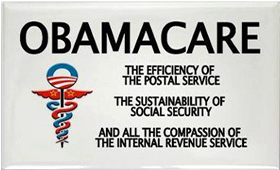The VA offers precisely what Obamacare offers: not a guarantee of treatment in time of need, but a guarantee of a place in line for treatment at a time of the bureaucracy’s choosing.
by Kevin O’Brien
The White House says Americans can’t draw any conclusions yet about just how screwed up is the Department of Veterans Affairs medical care system.
Well, yes, Americans can. And if they have any sense — always a debatable proposition — Americans will.
One conclusion we can draw is an old, familiar one: No matter what the issue or activity, bureaucracy’s first and strongest instinct is to protect itself in the face of a perceived threat.
Another conclusion is probably just dawning on those Americans with the wit to see it, because so very few of us have had a brush with a medical system of which government is the sole proprietor: Putting a government bureaucracy in charge of one’s health is a gamble likely to end badly.
And yet, if Obamacare stands, that is precisely the gamble each and every American eventually will take.
There is no better predictor of the course of a single-payer medical system in the United States than the VA system, because it is a single-payer system.
If an enrolled patient needs something done, he or she applies to the government-run system for approval; waits until the government-run system is ready to act; accepts the government-run system’s solution or, if dissatisfied, appeals to that same government-run system for relief. Because the bureaucracy pays the bill, the bureaucracy makes the decisions — when or if treatment will be given, and whether or not the patient has been well enough served.
In the VA system, it has recently come to light, scores of patients somehow got stuck on the second step of the bureaucratic flow chart: waiting. Their medical problems apparently were not deemed pressing enough to get them into a doctor’s examining room.
Forty veterans in the Phoenix area alone died while waiting for care at the VA, it’s alleged. It’s further alleged that VA employees maintained “secret waiting lists” and falsified records — in some cases under superiors’ orders — in an effort to hide the system’s inability or unwillingness to do the work taxpayers should expect.
Whistleblowers at six other VA offices across the nation are alleging similar treatment — or lack thereof — of veterans. Supervisors are being placed on administrative leave. A VA undersecretary has resigned. VA Secretary Eric Shinseki professes to be “mad as hell.” The president professes to be madder yet.
Republicans, being out of executive power, will rage and clamor. Democrats, being in executive power, will fume and sputter. “Reforms” will be enacted. “Safeguards” will be put in place. A few heads may roll.
But in the end, the bureaucracy will survive and set about restoring the illusion that it works for something other than its own preservation.
And the great triage — which is really what this is all about — will resume: A system with finite resources of money, time, talent and equipment will go back to deciding, on the basis of its own best interests, which corners to cut in which patients’ care. The demand will always outstrip the bureaucracy’s ability to offer treatment, so some will go without.
The VA system revelations are a scandal. But it isn’t a scandal attributable to Barack Obama, nor to George W. Bush, nor to any specific administration. It is the scandal of a promise that will not be kept because it cannot be kept — the promise that a government bureaucracy will find a way to stretch limited resources far enough to meet infinite demand.
Americans who watch this story play out and fail to make the clear and obvious connection to Obamacare will be guilty of willful ignorance. The systemic flaw is identical. It’s just magnified on a massive scale. Rather than making a false promise to treat all of the ills of a relatively few sick and injured military veterans, Obamacare has put the federal government on the path to taking responsibility for the medical needs — and the attendant costs — of the entire U.S. population.
Financial incentives and disincentives written into Obamacare will, if allowed to play out, wipe out first the market for individual health insurance plans and, not long after, the plans that employers buy for employees. The result — and this was certainly an intended consequence — will be a medical insurance system at first dominated by and eventually exclusive to the federal government.
The experience of veterans who get their medical care at the sufferance of the VA should be instructive to all Americans. The VA offers precisely what Obamacare offers: not a guarantee of treatment in time of need, but a guarantee of a place in line for treatment at a time of the bureaucracy’s choosing. For some, that time will never come.
Bureaucracies rightly see people as captive clients, not as customers free to take their business elsewhere. (If Obamacare is allowed to remain the law, eventually there will be no “elsewhere.”) So the place in line can change — or simply disappear — to suit the needs of the bureaucracy. Unless, of course, you “know somebody.”
Put government in charge of health care and medical need will be well down the list of reasons for making any decision.
When abuses come to light, everyone will be mad as hell. But after a little window dressing, the same system, based on the same false promise, with the same deficiencies and the same impossible mission, will go on and on.
O’Brien is The Plain Dealer‘s deputy editorial page editor.
